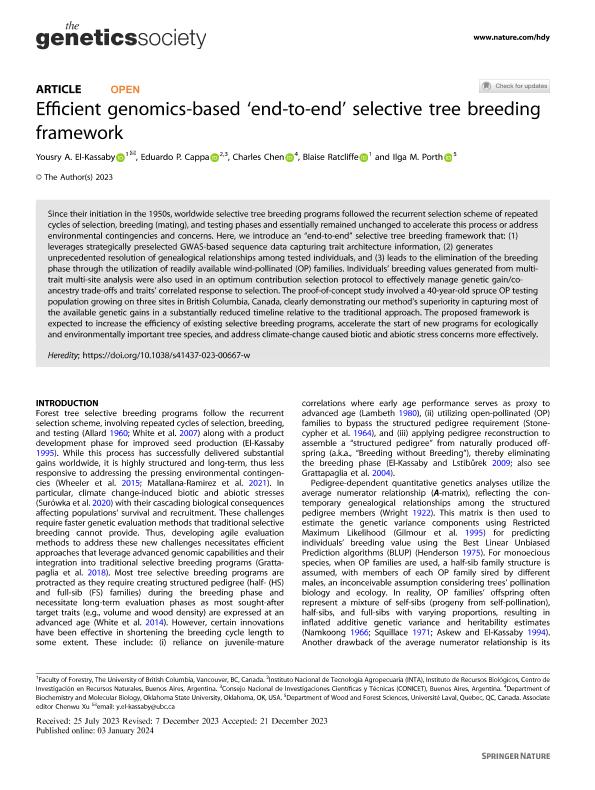Mostrar el registro sencillo del ítem
dc.contributor.author
El Kassaby, Yousry A.
dc.contributor.author
Cappa, Eduardo Pablo

dc.contributor.author
Chen, Charles
dc.contributor.author
Ratcliffe, Blaise
dc.contributor.author
Porth, Ilga M.
dc.date.available
2024-03-18T12:25:12Z
dc.date.issued
2024-01
dc.identifier.citation
El Kassaby, Yousry A.; Cappa, Eduardo Pablo; Chen, Charles; Ratcliffe, Blaise; Porth, Ilga M.; Efficient genomics-based ‘end-to-end’ selective tree breeding framework; Nature Publishing Group; Heredity; 132; 2; 1-2024; 98-105
dc.identifier.issn
0018-067X
dc.identifier.uri
http://hdl.handle.net/11336/230780
dc.description.abstract
Since their initiation in the 1950s, worldwide selective tree breeding programs followed the recurrent selection scheme of repeated cycles of selection, breeding (mating), and testing phases and essentially remained unchanged to accelerate this process or address environmental contingencies and concerns. Here, we introduce an “end-to-end” selective tree breeding framework that: (1) leverages strategically preselected GWAS-based sequence data capturing trait architecture information, (2) generates unprecedented resolution of genealogical relationships among tested individuals, and (3) leads to the elimination of the breeding phase through the utilization of readily available wind-pollinated (OP) families. Individuals’ breeding values generated from multi-trait multi-site analysis were also used in an optimum contribution selection protocol to effectively manage genetic gain/co-ancestry trade-offs and traits’ correlated response to selection. The proof-of-concept study involved a 40-year-old spruce OP testing population growing on three sites in British Columbia, Canada, clearly demonstrating our method’s superiority in capturing most of the available genetic gains in a substantially reduced timeline relative to the traditional approach. The proposed framework is expected to increase the efficiency of existing selective breeding programs, accelerate the start of new programs for ecologically and environmentally important tree species, and address climate-change caused biotic and abiotic stress concerns more effectively.
dc.format
application/pdf
dc.language.iso
eng
dc.publisher
Nature Publishing Group

dc.rights
info:eu-repo/semantics/openAccess
dc.rights.uri
https://creativecommons.org/licenses/by-nc/2.5/ar/
dc.subject
GWAS
dc.subject
GENOMIC SELECTION
dc.subject
QUANTITATIVE GENOMICS
dc.subject
TREE BREEDING
dc.subject.classification
Otras Ciencias Agrícolas

dc.subject.classification
Otras Ciencias Agrícolas

dc.subject.classification
CIENCIAS AGRÍCOLAS

dc.title
Efficient genomics-based ‘end-to-end’ selective tree breeding framework
dc.type
info:eu-repo/semantics/article
dc.type
info:ar-repo/semantics/artículo
dc.type
info:eu-repo/semantics/publishedVersion
dc.date.updated
2024-03-14T15:08:17Z
dc.identifier.eissn
1365-2540
dc.journal.volume
132
dc.journal.number
2
dc.journal.pagination
98-105
dc.journal.pais
Reino Unido

dc.description.fil
Fil: El Kassaby, Yousry A.. University of British Columbia; Canadá
dc.description.fil
Fil: Cappa, Eduardo Pablo. Consejo Nacional de Investigaciones Científicas y Técnicas; Argentina. Instituto Nacional de Tecnología Agropecuaria. Centro de Investigación de Recursos Naturales. Instituto de Recursos Biológicos; Argentina
dc.description.fil
Fil: Chen, Charles. Oklahoma State University; Estados Unidos
dc.description.fil
Fil: Ratcliffe, Blaise. University of British Columbia; Canadá
dc.description.fil
Fil: Porth, Ilga M.. Laval University; Canadá
dc.journal.title
Heredity

dc.relation.alternativeid
info:eu-repo/semantics/altIdentifier/url/https://www.nature.com/articles/s41437-023-00667-w.pdf
dc.relation.alternativeid
info:eu-repo/semantics/altIdentifier/doi/http://dx.doi.org/10.1038/s41437-023-00667-w
Archivos asociados
